| Srl | Item |
| 1 |
ID:
096166
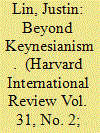

|
|
|
| 2 |
ID:
167056


|
|
|
|
|
| Summary/Abstract |
After painful reform and restructuring of post-1997 financial crisis, many scholars equated South Korea’s ‘post-developmental state’ with neo-liberal state. However, in doing so, they ignored South Korea’s lasting legacy of interventionist ‘developmental state’ that led nation’s miraculous transformation from a poor agrarian society to a prosperous industrial economy. This article stresses that South Korea indeed tried to adopt some of the policy prescriptions suggested by neo-liberal ideas but moving beyond the dictates of neo-liberalism it also strengthened state capacity to augment non-market mechanisms.
|
|
|
|
|
|
|
|
|
|
|
|
|
|
|
|
| 3 |
ID:
100275


|
|
|
|
|
| Publication |
2010.
|
| Summary/Abstract |
While sociologists and political scientists have become interested in the role of ideas in the political process, relatively little work looks at how ideological claims are actually deployed in political discourse. This article examines the economic claims made in two pairs of Congressional debates over tax cuts, one (in 1962 and 1964) generally associated with Keynesian economic theories, and one (in 1978 and 1981) tied to supply-side ideas. While these bills were indeed initiated by groups subscribing to different economic ideologies, subsequent debates look surprisingly similar. The bills were closer in substance than one might expect, and while their proponents came from opposite political camps, in both cases supporters focused more on supply-side than demand-side effects and emphasized tax cuts' ability to pay for themselves through economic stimulation. The authors propose that politically acceptable economic claims may evolve more slowly than the economic theories that inspire policy entrepreneurs, and that this "discursive opportunity structure" may not only constrain the political process but may potentially shape the political effects of expert knowledge.
|
|
|
|
|
|
|
|
|
|
|
|
|
|
|
|
| 4 |
ID:
109965
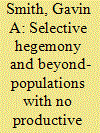

|
|
|
|
|
| Publication |
2011.
|
| Summary/Abstract |
A significant shift in the form of the political economy since the 1980s is frequently described as a shift from the welfare state to neoliberalism, the latter either referring to new principles of rule or more broadly to include the nature of the economy. The paper argues that it is more fruitful to explore how these changes reflected a shift in the dominance of forms of capital-principally from production to finance. The dominant class blocs in the former period pursued hegemonic projects described here as expansive; in the latter period such projects became selective. Insofar as finance capital seeks security through diversification (benefitting from difference) and is not itself productive of value, so it relies on and [re-]producesrespectively, a) selected populations invested in distinctions, and b) an absolute residual population. The politics of the former is one of negotiation, of the latter counter-politics beyond negotiation. Exploration of this difference becomes a crucial task for social analysis.
|
|
|
|
|
|
|
|
|
|
|
|
|
|
|
|
| 5 |
ID:
151483
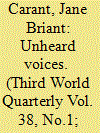

|
|
|
|
|
| Summary/Abstract |
The United Nations’ 2001 Millennium Development Goals and 2015 Sustainable Development Goals are of major importance for worldwide development. This article explores the construction of poverty and development within and across these documents, specifically focusing on the influence of dominant economic discourses – Keynesianism and neoliberalism – in the development paradigm. It assesses the failures of the Millennium Development Goals, as articulated by oppositional liberal feminists and World Social Forum critics, who embody competing values, representations and problem-solution frames that challenge and resist the dominant economic discourses. Finally, it evaluates responsiveness of the UN in the constitution of the Sustainable Development Goals.
|
|
|
|
|
|
|
|
|
|
|
|
|
|
|
|
| 6 |
ID:
178493
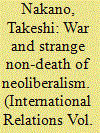

|
|
|
|
|
| Summary/Abstract |
This essay provides a hypothesis about how geopolitical environments significantly affect the rise and fall of modern economic ideologies. First, it articulates how the two world wars transformed political, social and ideological conditions into those favourable for the rise of Keynesianism. Second, it theoretically identifies the political and social foundations of Keynesianism with expanded state capacity, social cohesion and social equality, all of which were by-products of major wars. Third, it shows how the transformation of geopolitical environments and the change of the nature of warfare since the late 1960s undermined the political and social foundations of Keynesianism and paved the way for the rise and dominance of neoliberalism. By shedding light on military and geopolitical dimensions of international environments, our hypothesis well explains the sudden fall of Keynesianism in the 1970s and the current robustness of neoliberal dominance.
|
|
|
|
|
|
|
|
|
|
|
|
|
|
|
|
| 7 |
ID:
084359
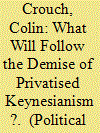

|
|
|
| 8 |
ID:
092649


|
|
|
|
|
| Publication |
2009.
|
| Summary/Abstract |
Hay's argument that the 'winter of discontent' was essentially a manufactured crisis was discussed at the British Academy on the thirtieth anniversary of the 22 January 1979 public sector 'day of action'. In the edited transcript of that discussion which we publish here, three contemporary actors offer some support for, but also clear rejoinders to Hay. David Lea applauds the credit Hay gives to the efforts of the unions to make pay policy work in the late-1970s. David Lipsey argues Hay is wrong, it was a real crisis (albeit part of a battle between two very crude political narratives) and one in which the unions essentially betrayed the Labour government's attempts to sustain social democracy. Kenneth Baker also thinks the crisis was real, but he sees it as the inevitable end of Britain's postwar settlement. A number of other distinguished commentators also offer their perspective.
|
|
|
|
|
|
|
|
|
|
|
|
|
|
|
|
| 9 |
ID:
092648
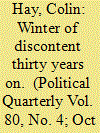

|
|
|
|
|
| Publication |
2009.
|
| Summary/Abstract |
Thirty years on, and in the context of our own crisis, it is perhaps useful to take stock of the last Winter of Discontent. The industrial strife that beset the Callaghan government in the winter of 1978/79 was seen at the time as a key factor in Labour's defeat in the general election of 1979; but its legacy is considerable and its significance enduring. These four themed essays come from a public seminar at the British Academy to mark the thirtieth anniversary of the Winter of Discontent. Colin Hay argues that the Winter of Discontent was, in key respects, a manufactured crisis lived, experienced and responded to through a very particular construction of the events that is difficult to reconcile with the evidence itself. Reponses by Lords Baker, Lea and Lipsey follow and the section concludes with a transcribed and edited version of the lively discussion which ensued.
|
|
|
|
|
|
|
|
|
|
|
|
|
|
|
|